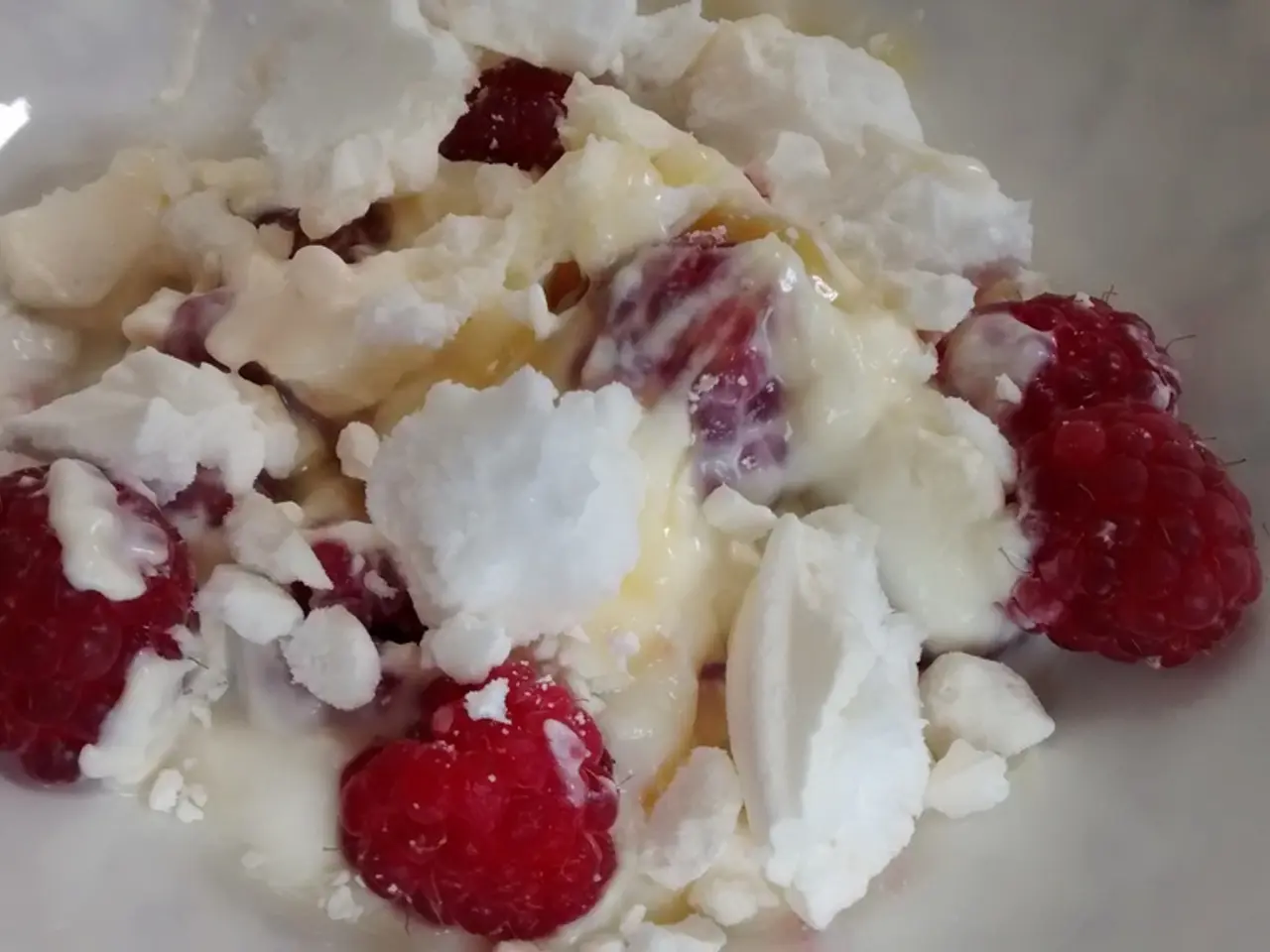Dietary guidelines for Interstitial Cystitis: Consuming and abstaining from specific foods
For those suffering from interstitial cystitis (IC), managing diet can play a crucial role in alleviating symptoms and improving overall quality of life. A well-balanced diet for IC focuses on avoiding irritants and consuming gentle, non-acidic, whole foods that are easy to digest and support bladder health.
A sample menu for an IC-friendly diet could include a variety of fruits such as avocados, bananas, blueberries, melons, pears, apricots, dates, prunes, and raisins. Non-citrus fruits like apples, grapes, coconut, and watermelon are also recommended. Vegetables such as asparagus, celery, bell pepper, broccoli, beets, eggplant, peas, mushrooms, and spinach are also beneficial.
Whole ancient grains such as amaranth, barley, oats, quinoa, buckwheat, spelt, millet, kamut, sorghum, teff, farro, and freekeh are encouraged, while GMO crops like wheat, corn, soy, and white rice should be avoided. Legumes such as lentils, garbanzo beans, lima beans, mung beans, black beans, and green beans are also part of a typical IC diet, with larger beans like kidney and pinto beans being harder to digest and thus best avoided.
Lean proteins including fish, chicken breast, turkey, low-fat beef, eggs, and pork are recommended, as well as nuts, seeds, and fiber-rich foods like almonds, walnuts, cashews, macadamia nuts, pistachios, and sunflower seeds. Dairy products like cream cheese, cheddar cheese, low-fat and nonfat milk, and nut butters such as almond butter and cashew butter are also included in the diet.
In addition to these foods, water, pear juice, and chamomile or peppermint tea are recommended for hydration and relief. A wrap with cream cheese, chicken, avocado, and spinach, or oatmeal with bananas, nut butter, and blueberries are examples of breakfast options. Lunch could consist of rice, asparagus, and baked salmon, brown rice, grilled chicken, and broccoli, or a wrap with cream cheese, chicken, avocado, and spinach. Tuna salad sandwich or pork chops with mashed potatoes and green beans are options for dinner.
Patients are often advised to initiate an elimination diet to identify their personal trigger foods and build a customized diet plan accordingly. Avoiding all known bladder irritants such as caffeine, alcohol, spicy foods, and citrus is commonly recommended during flare-ups.
According to the American Urological Association, dietary changes can help people manage or avoid interstitial cystitis flare-ups. If symptoms do not improve after making dietary changes, a person should contact a healthcare professional.
In summary, managing IC symptoms through diet focuses on avoiding irritants and consuming gentle, non-acidic, whole foods that are easy to digest and support bladder health. By following these guidelines, individuals with IC can take control of their diet and potentially alleviate their symptoms.
[1] Interstitial Cystitis Association. (n.d.). Diet and Nutrition. Retrieved from https://www.ichelp.org/community/diet-nutrition/ [2] National Institute of Diabetes and Digestive and Kidney Diseases. (n.d.). Interstitial Cystitis. Retrieved from https://www.niddk.nih.gov/health-information/urologic-diseases/interstitial-cystitis [3] National Kidney Foundation. (n.d.). Interstitial Cystitis. Retrieved from https://www.kidney.org/atoz/content/interstitialcystitis [4] Mayo Clinic. (2018, May 30). Interstitial cystitis. Retrieved from https://www.mayoclinic.org/diseases-conditions/interstitial-cystitis/diagnosis-treatment/drc-20375789 [5] National Institute of Diabetes and Digestive and Kidney Diseases. (2015, October). Interstitial Cystitis: What You Need To Know. Retrieved from https://www.niddk.nih.gov/health-information/urologic-diseases/interstitial-cystitis/what-you-need-to-know
- Managing disease like migraine, Alzheimer's, ankylosing spondylitis, type-2 diabetes, and chronic kidney disease also requires careful attention to diet.
- Science has shown that nutrition plays a vital role in predictive medical conditions, such as urinary chronic diseases, psoriasis, Crohn's disease, and respiratory conditions.
- For eye health, foods rich in omega-3 fatty acids, vitamins A, C, and E are beneficial.
- Health and wellness can be improved by focusing on fitness and exercise, skin care, and mental health.
- In the workplace, workplace-wellness programs can help employees manage their chronic diseases and medical conditions effectively.
- CBD, a widely popular supplement, is often used to treat various health issues, including pain, anxiety, and inflammation.
- Women's health includes specific concerns such as menstrual issues, pregnancy, and menopause.
- Sports like football, soccer, baseball, hockey, golf, and tennis can be good for overall fitness and exercise.
- Sports-betting can be a form of entertainment, but it's important to be aware of its potential risks and consequences.
- Racing, whether it's auto racing, horse racing, or mixed martial arts, can be exciting spectator sports.
- Weather conditions can affect certain sports, making it crucial to plan accordingly.
- Tennis analysis, including both statistical data and on-court observations, can provide valuable insights into players' performances.
- A well-balanced diet can help manage and prevent chronic-diseases such as type-2 diabetes, chronic-kidney-disease, and various respiratory conditions.
- Foodandfoodbenefits is a resource for learning about the nutritional value of different foods and their benefits for health.
- AQ, or air quality, can affect both health and sports performance, particularly in outdoor activities.
- In the context of health and wellness, therapies and treatments can include both conventional medicine and alternative therapies.
- Psoriasis treatments can be prescription creams, light therapy, and systemic medications.
- Crohn's disease treatments often involve a combination of medications, diet, and sometimes surgery.
- Science continously explores new ways to better understand and treat various diseases, such as Alzheimer's, migraine, and ankylosing spondylitis.
- Football, basketball, soccer, baseball, hockey, golf, racing, and tennis are popular sports with various fan communities around the world.
- Spondylitis, like other chronic diseases, typically requires ongoing management, including diet, exercise, and potentially medications.




